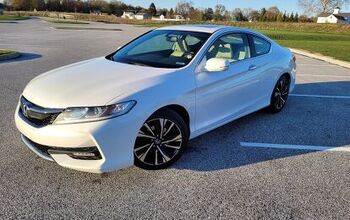Pent-Up Demand AWOL: Less Than 13 Million Sales Expected For This Year

U.S. auto sales will probably come in lower than 13 million this year, Ford’s CFO Lewis Booth told Bloomberg. That’s below the low end of Ford’s estimate.
According to Bloomberg, “Ford had forecast industry wide 2011 sales of 13 million to 13.5 million vehicles, including medium- and heavy-duty trucks, in its home market.” Booth is not alone with his prediction that we will see less than that. Analysts are cutting their forecasts. Last month, the average estimate of 18 analysts surveyed by Bloomberg was 12.7 million.
As for the fabled pent-up demand, it seems to be in hiding.
“We see signs of pent-up demand,” Booth said at a UBS conference in London. “What it’s going to take for that pent-up demand to emerge is some confidence in what the future will look like.” Ford anticipated a modest U.S. recovery, “but we didn’t expect it to be quite as slow as it’s been.”

Bertel Schmitt comes back to journalism after taking a 35 year break in advertising and marketing. He ran and owned advertising agencies in Duesseldorf, Germany, and New York City. Volkswagen A.G. was Bertel's most important corporate account. Schmitt's advertising and marketing career touched many corners of the industry with a special focus on automotive products and services. Since 2004, he lives in Japan and China with his wife <a href="http://www.tomokoandbertel.com"> Tomoko </a>. Bertel Schmitt is a founding board member of the <a href="http://www.offshoresuperseries.com"> Offshore Super Series </a>, an American offshore powerboat racing organization. He is co-owner of the racing team Typhoon.
More by Bertel Schmitt

































Comments
Join the conversation
The car bailout was insignificant in the big picture of government spending, but it was very significant to the people, companies and communities directly affected. In the big picture, I'd say the number one factor in economic problems is a mortgage securitization market that was flawed to the core. Separating the servicing of mortgage loans from the underwriting of the loans created an industry that systematically underestimated mortgage risks while inflating home prices. At the same time, banks didn't even protect themselves by properly executing paperwork on their mortgages. Diverging objectives between tiers of securitized mortgage interests is making it hard to do mortgage modifications that are objectively good for the borrowers the communities and even the majority of mortgage investors. Finally a completely messed up mortgage assignment system (MERS) has made it difficult to determine who really has a valid mortgage. Our major banks have been subsidized to the tune of hundreds of billions of dollars, and still many of them are on the verge of failure (BofA cough!). So many people rag on the autoworkers in this forum, but if the autoworkers, union and otherwise, built cars as poorly as the bankers set up and implemented the mortgage securitization system, the average new car wouldn't last 1,000 miles.
Do we do polls here? This would be an interesting one to see the results of. It could go something like this: A) I never bought new cars. Ever. B) I have always bought new cars but kept them for a long time (6 to 10 years or even longer). C) I used to purchase a new car every 3 to 5 years (or sooner) and still do. D) I used to purchase a new car every 3 to 5 years (or sooner), but now have stopped that practice based on the current economic situation. I, myself would check option "D", so count me in as part of the reason new car sales are lower. I actually spent the better part of a decade and a half buying (or leasing) a new car every 1 to 3 years. Those days are over for me and my two daily drivers are a '91 and '96, and I plan to use them till they're dead.
The new reality in car buying, I believe, is people like me: People who save in advance for that new (or newer used) car, when they buy they pay cash, and immediately start re-saving against the time when that car is going to need to be replaced. I'm currently in the final stages of pre-buying. Once I get the savings account in the $30-35k level, I've got $18-20k for the purchase of a new car (and I'm really in the mood for a new one this time around - been buying only used since 2000), and I still have a good cushion against emergencies. Once the car is bought (probably winter/spring 2012) it's time to start restocking the bank account against the inevitable next purchase. Happily, I love 'B' class cars, insist on manual transmissions, so my proposed budget leaves me some reasonably desirable alternatives (Fiesta, Mazda2, Fit, Fiat 500, and I'm seriously curious about the Sonic). I've had to laugh at the financial twistings and turnings going on over the past three years, because the above is how I've always bought cars, motorcycles, electronics . . . . . . well, everything but my house. And the mortgage was paid off a year and a half ago. Other than the mortgage, I can't remember when I've paid interest on anything. And I intend to keep it that way. Said attitude worked for my father just fine, I can't see why it won't work for me. And I'm not lacking for entertainment (the garage is currently a Porsche, four motorcycles and 17 bicycles) by being too parsimonious.
Thirty years ago you financed a new car for 24 to 36 months, and put 10 to 20% down. No leasing. You got a new pickup truck because you couldn't afford a new car (pickups were cheaper!). You got a Toyota or Datsun because they were cheaper. I submit that those terms may just be the norm. The soaring car prices in recent years have paralleled working couples and the social acceptance of huge debt. That bubble popped. Cars are now nakedly expensive, with ridiculously high finance terms. This may well be the new normal. Car prices will simply have to come down. Manufacturers putting cash on the hood is not an incentive- it is the true market price of the item. A year from now we'll still be making excuses that as soon as operations are back from tsunami damage, all will be good. Three years ago the used house organization spokespeople were yapping about pent-up demand, how houses will soar again by 2010. The fake 'pent-up' demand call has reappeared. It may appease shareholders, but only for so long.